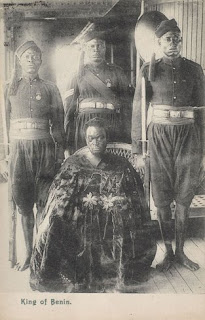
VIRGINIANS, FOR YOUR LANDS, FOR YOUR HOMES, FOR YOUR SWEETHEARTS, FOR YOUR WIVES!
Monday, November 26, 2012
“We want three things: powder, ball and brandy; and we have three things to sell: men, women and children." African Chief
“but the inescapable fact that stuck in my craw was: my people had sold me…..My own people had exterminated whole nations and torn families apart for a profit before the strangers got their chance for a cut. It was a sobering thought." Zora Neale Hurston - considered one of the pre-eminent writers of twentieth-century African-American literature.
The British diplomat Wilmot, explained to King Gelele: "England has been doing her utmost to stop the slave trade in this country. Much money has been spent, and many lives sacrificed to obtain this desirable end, but hitherto without success. I have come to ask you to put an end to this traffic and to enter into some treaty with me."
Gelele refused: "If white men came to buy, why should I not sell?" Wilmot asked how much money he needed. "No money will induce me...I am not like the kings of Lagos and Benin. There are only two kings in Africa, Ashanti and Dahomey: I am King of all the Blacks. Nothing will compensate me for the loss of the slave trade." Gelele also told Burton, "If I cannot sell my captives taken in war, I must kill them, and surely the English would not like that. King Gelele of Africa
Glele, despite the formal end of the slave trade and its interdiction by the Europeans and New World powers, continued slavery as a domestic institution: his fields were primarily cared for by slaves, and slaves became a major source of 'messengers to the ancestors', in other words, sacrificial victims in ceremonies.
Subscribe to:
Post Comments (Atom)

No comments:
Post a Comment
Note: Only a member of this blog may post a comment.